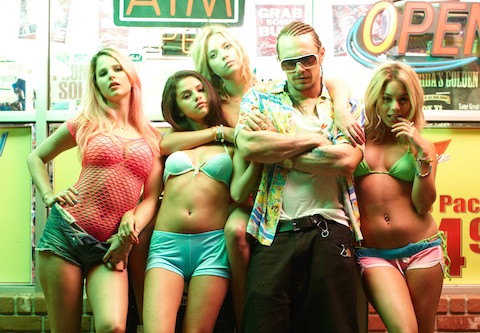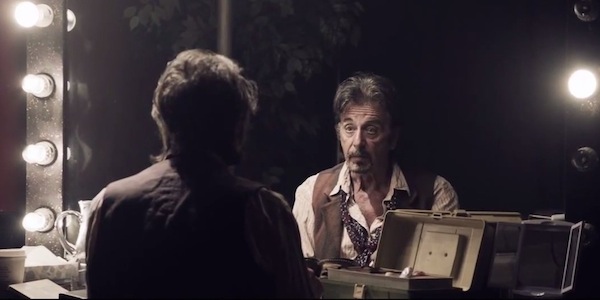Tag Archives: Film
Citizen Kane (1941): Anatomy of a Classic
***
Nice.
— J.W.
The Best Midnight Movie Candidates of the 21st Century
The Humbling (2014)
I Miss the Video Store: What Netflix’s Algorithims Get Wrong
Selma (2014)

12 Years a Slave (2013)
reposting this because I finally rewatched the movie over the weekend.
There may be humane masters, as there certainly are inhuman ones – there may be slaves well-clothed, well-fed, and happy, as there surely are those half-clad, half-starved and miserable; nevertheless, the institution that tolerates such wrong and inhumanity as I have witnessed, is a cruel, unjust, and barbarous one. Men may write fictions portraying lowly life as it is, or as it is not – may expatiate with owlish gravity upon the bliss of ignorance – discourse flippantly from arm chairs of the pleasures of slave life; but let them toil with him in the field – sleep with him in the cabin – feed with him on husks; let them behold him scourged, hunted, trampled on, and they will come back with another story in their mouths. Let them know the heart of the poor slave – learn his secret thoughts – thoughts he dare not utter in the hearing of the white man; let them sit by him in the silent watches of the night – converse with him in trustful confidence, of “life, liberty, and the pursuit of happiness,” and they will find that ninety-nine out of every hundred are intelligent enough to understand their situation, and to cherish in their bosoms the love of freedom, as passionately as themselves.
– Solomon Northup, Twelve Years a Slave (1853).
When we first meet Solomon Northup, he is nearing the end of his journey, most of the horrors that have befallen him are behind him. He has by this point in time been moved around several times through rural Louisiana; he has faced beatings, whippings, death, despair, sickness, death once more, and then again and again; but, when we first lay eyes upon this learned man from the North, who, by horrible circumstance, is thrust deep in to the heart of the boiling, bubbling cruelty that lies at the heart of the deep South, circa 1852, he is suffering from the worst cruelty of all: hope. Hope in that the letter he is writing – the ink made painstakingly from berries, ones that he has smuggled himself from his own meager dinner – will reach the family he was so cruelly stolen away from; hope that after all those twelve-odd years of being under the horrible, hateful eye of “that peculiar institution,” the light at the end of the tunnel – apologies for trying to bring a dull cliché across your loving eyes, dear readers – is really real, and his long nightmare is finally coming to an end. We see this same scene twice in the narrative, and it is only by our second glance at our hero’s feverish writing by candlelight (the berries boiled and ready for the smuggled page) that we realize how dear and fragile our very own freedom is.
At this very moment I am writing to you from the comfort of my couch, music on, windows open, and I know that as I go to sleep I can wake whenever I damn well please, tomorrow holding all the promise of getting to type, type, type away again and again, writing for as long as I want at whatever time I wanted. It was only when I was a child that I cherished my secret affairs with the written word: long nights bent over a book, or my typewriter, and these were just the early days of my work, and the early years are always the fondest – oh, the fucking effort I would put in to muffling the sound of my typewriter, knowing that if their clack-clack noise betrayed me, I’d be faced with a set of pissed off parents. The writing was more enjoyable knowing that I was doing so in secrecy. And what if I had to use those words to gain my own freedom?? would my lack of talent rise knowing my life hung in the balance?? would I hold words closer and dearer than I already do know? My heart says “not impossible” but my mind says I could always hold them closer. They are sometimes written in my own blood.
Tight is sometimes not tight enough.
This question of freedom lies at the very heart of Steve McQueen’s brilliant & harrowing adaptation of Solomon Northup’s memoir 12 Years a Slave, which, as I’m sure you’re aware, won the Academy Award for Best Picture less than a week ago (I’m nothing if not an opportunist, you see). Consider: at the beginning of Solomon Northup’s terrifying journey – in a linear sense, that is – he is an articulate, intelligent, and free black man living in Saratoga, New York, with his beautiful wife and two children. The year is 1841. Note: 1841 just so happens to be the same year as the U.S. Supreme Court’s famous Amistad decision. Solomon, enticed by an offer to travel to Washington, D.C., and play music, the offer tendered by two (seemingly) kind white men putting together a traveling show. Looking to supplement his family’s income, Solomon accepts their offer. This fateful night would be the last time he would see his family for twelve years. These two young men are con-artists, nothing more than evil slave-traders in disguise, and after drugging Solomon they sell him into slavery. Having no rights and stripped of his name, not to mention no way of petitioning the courts, his journey into the deep, dark heart of slavery begins – he is now a slave in a system that is as cruel as it is oppressive, a natural father of fear, pain, death, and paranoia, and as Solomon moves through his twelve-year journey, he sees all the assorted evils of this system made bare. Ink created from smuggled berries can never wish to contain all the pain and suffering one must feel as a product of this system, and the dim-light of a candle on a stump is more than enough to illuminate all the hatred on Solomon Northup’s studied face. That face, always so calm on the face of terror, can not take anymore. His soul, strong as it is, is collapsing.
Throughout the course of the movie, it is easy to see the genius in what McQueen has accomplished: instead of turning his camera away from the horrors that Solomon must face, McQueen – a black man from Britain, the material then being both a personal statement for the artist as well as being removed enough from all the history that came after the fall of slavery to be objective and therefore pure, the film possessing both a beating heart and an academic mind that says this is the face of evil, this is what we are capable of doing to each other – uses his camera to bring us ever closer Solomon, to take us on an odyssey alongside the evils of slavery, to give us a glimpse on how this affects a man as intelligent and senstive as Mr. Northup. This a documentary approach to these integral part of the American story, ugly as it is, and the viewer feels truth in this – remember what is was like the first time you sat down and watched Schindler’s List and found yourself unable to look away. Like Spielberg’s film, McQueen’s able, probing, and thoughtful camera gives us extra-helpings of human decency – for example: Solomon’s first “Master,” Mr. Ford (Benedict Cumberbatch), recognizes his intelligence and gifts him a violin, not to mention watching over him as the collective shitheads of a Louisiana community wish to hang him – and the callousness of deal souls and vicious hearts, best personified by the malevolent, not to mention psychotic, Edwin Epps (Michael Fassbender).
Fassbender, in what is arguably the most convincing — not to mention ruthless and bone-chilling — performance in the movie, gives us honesty through his hatred – the unspoken honesty that all the cruelties he has inflicted on the innocent is rotting his heart out from the inside.
It is not spoken, and Epps does his best to hide it via a cocktail of animalism and old-time religion; but as humans we understand that your eyes and your actions betray you, and by the end of this film Epps can no longer hide just how deep the rot goes. He is losing control over all he holds certain; he drinks hypocrisy right alongside the whiskey he drinks from a flash whenever he can get the chance. He is losing control, he is losing power, and he wishes to establish his “dominance” and “authority” the only way he knows how: through subjugation. The more he beats and punishes Solomon, and the more he brutalizes and rapes Patsy (the elegant and ever-lovely Lupita Nyong’o, a hero in her own time), the greater the smell of the rot. It is hard to imagine that a man as brutal as Epps can even harbor a rot – don’t you need a soul to watch it shake & crumble?? – but somehow he keeps going deeper into his own madness. He has been ripped apart, and everyone around him – especially the slaves – must pay the consequences for the damage to his pride. He is an evil man, and it is hard to pity him.
Was 12 Years a Slave deserving of Best Picture last Sunday? I can’t speak for those Academy voters who admitted to never watching the movie, and that is always a tough (see: impossible) question to answer, since it’s, uh. you know, a subjective question; but, in my humble, useless opinion, skewered by marijuana and many sleepless nights, I believe that I can answer in the affirmative. For every last painstaking step of Solomon Northup’s dark odyssey – twelve years bottled down to some two-hours and twenty-four minutes – I was, to use an overused word, “riveted.” When you consider that this is only McQueen’s third film, one can only hope that we’re seeing a new and provocative auteur come to life. I, like the rest of the public, await his next move.
And yes, I cried like a little bitch at the end. I couldn’t help it — I have a big heart. You know what? Whatever. Stop looking at me like that. I can feel judging me with your eyes. Go to another blog if you wish to read the words of the boring and cold-hearted. I don’t care. (What a movie.)
— Jackson Williams.
How ‘Selma’ Got Screwed:
The Best Merch Inspired by the Films of Stanley Kubrick
Do Wes Anderson Movies Actually Make Money?
Indie and art house film has always extended the possibility of artistic freedom—at least as much as it’s possible for any auteur to pursue a singular vision in a medium that requires the input of everyone from actors and producers to key grips and the tweakers on craft service. Hollywood is to film what Nashville is to music, the thinking goes—where formulaic pap is churned out for the general public, whereas indie (like alt-country or Americana) allegedly offers the possibility of something less polluted by conformity and commercial concerns.
Of course, cinematic liberty can be a bad thing. Just look at the chronically self-indulgent and mediocre films of Woody Allen, which have cried out for the firm hand of an editor for the better part of twenty years. M. Night Shyamalan and George Lucas also offer cautionary tales of what happens when an artiste can get a big budget to…
View original post 1,763 more words
Actors Revisit Their Famous Roles in Normal Attire
Empire Magazine is the largest selling film magazine in Britain and has been published monthly since 1989. To celebrate their 20th anniversary, they published a special edition of their magazine that was guest-edited by Steven Spielberg.
In a special section entitled The Birthday Portfolio, Empire had an exclusive star-studded photoshoot that paid tribute to some of the most iconic moments in movies in the last 20 years (1989 – 2009). The 20th anniversary issue featured over 27 Hollywood stars reliving some of their famous performances in their normal everyday attire.
Below is a snippet from this amazing photo series via atticus_finch on LiveJournal. To order the Empire 20th Anniversary Edition online go to: http://www.subscription.co.uk/home/prods.asp?m=807
1. Arnold Schwarzenegger – The Terminator
2. Anthony Hopkins & Jodie Foster – The Silence of the…
View original post 345 more words
Dick: The Forrest Gump of Stoner Movies
It is the fate of the cult movie to be ahead of its time. One thinks of David Cronenberg’s Videodrome, which opened to middling reviews and pitiful box office receipts in 1983, only to see its dark media fantasia look far more prescient as video games and the Internet matured in the 1990s. Mike Judge had the distinction of directing two modern classics that tanked at the box office but flourished in video release; 1999’s Office Space resonated with the deepening economic malaise of the early twenty-first century, while 2006’s Idiocracy makes more sense today than ever before.
Sometimes, though, a film manages to be both ahead of and behind its time—as the 1999 alternate-history farce Dick makes clear. Numerous commentators over the years have noted that the Watergate spoof faced an impossible dilemma in its search for an audience; as a quasi-teen movie, it likely turned off the…
View original post 1,963 more words












